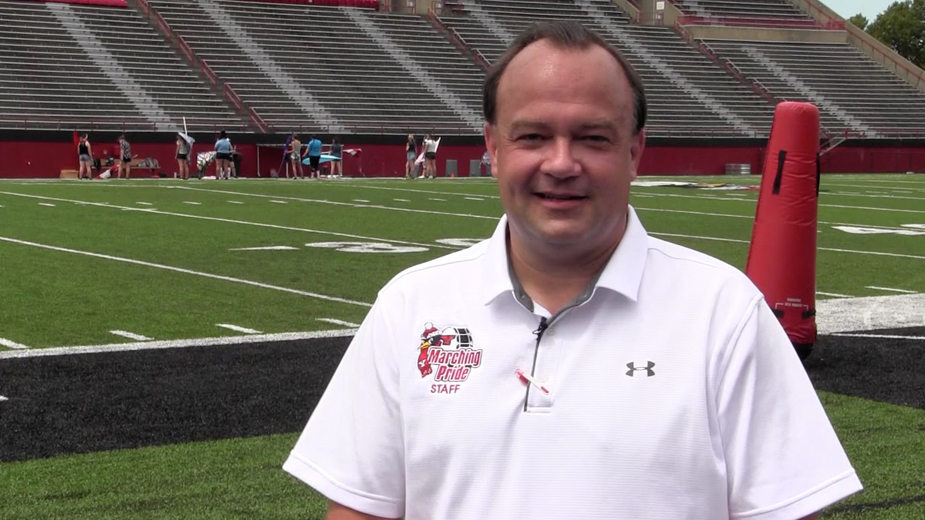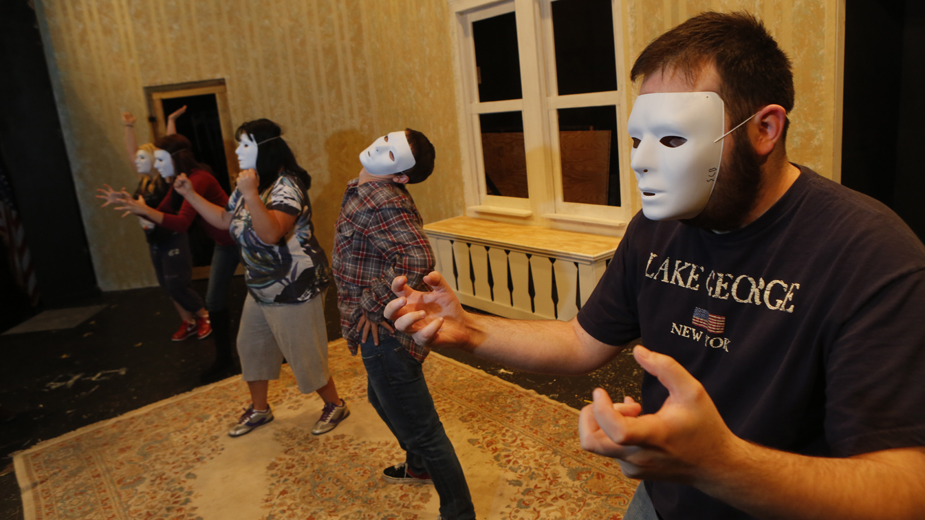YOUNGSTOWN, Ohio – Don’t be surprised if you hear live music coming out of the Wick Avenue parking deck at Youngstown State University this fall.
The new practice space is just one of the adjustments the university has made to educate performing arts students during the coronavirus pandemic.
After being closed since March, the campus has reopened for the fall semester. But social distancing rules for a large musical ensemble mean a lot of space is needed, so the Dana School of Music at YSU has blocked off an area in the parking deck.
“We’ve tried to keep up instruction as best we can,” says Randall Goldberg, director of the Dana and an associate professor.
The parking deck space “is not the most aesthetically pleasing space, but it’s a safe place to play,” he says. “It has a roof and lighting and the acoustics really aren’t that bad.”
The school has also rented two large tents that have been erected outside of Bliss Hall as teaching space for ensembles. The Dana Orchestra will also practice in Stambaugh Auditorium, where it can spread out on stage and in the seating area.
“Improvisation is the name of the game,” says Phyllis Paul, dean of the Cliffe College of Creative Arts and Communication at YSU, which oversees music and theater.
The college has been trying to maintain a semblance of normality, she said, and it appears to be working. Although final enrollment numbers will not be known until Sept. 14, Paul says Cliffe College is doing well.
“We’re optimistic it will not have slipped by much,” she says. “I can’t say enough how proud I am of our faculty, who have been working with the chairs to get ready for the fall, to continue to deliver art education in this new space.”
Paul says the strong enrollment is “testament to how much students crave getting together to make art.”
Some educators feared that incoming freshmen would take a year off, but that hasn’t happened. With virus regulations squeezing the economy and canceling or limiting most events, it’s better to go to school and get the base-level classes out of the way, Paul says.
While in-person music instruction will take place on campus with social distancing, most academic classes will be online to free up space, Goldberg says. Teleconferencing is also being used for some classes.
Blocking the spraying of droplets from the mouth is a task of particular concern for any music school. Playing brass and woodwind instruments, and especially singing, pose the biggest challenges, Goldberg says. For safety, covers will be placed over the open end of horns and Plexiglas dividers will also be in place when necessary.
“Research is still emerging,” Goldberg says. “Aerosol does come out of the sides of the mouth [when playing a horn or woodwind] and the finger holes of a woodwind.”
There is a “lot of attention to singing,” he says, “because it pushes a lot of air through the body… We’re trying to find ways to make it work.”
In addition to distancing and the dividers, one solution could be singing masks, which have recently been developed, Paul says.
A big part of music education is performing for the public and each semester the Dana School provides dozens of such performances. This year, though, almost all will be virtual. Exceptions could include a Marching Pride band preview show and the weekly Music at Noon concerts at the Butler Institute of American Art.
The Pipino Performing Arts Series has also been canceled for the season. Student art exhibitions will be moved to online platforms.
Carols and Cocoa, the annual Christmas concert at Stambaugh that puts hundreds of singers and musicians on stage, will not be possible this year, Goldberg says. In a normal year, it’s one of the biggest events for the Dana.
Youngstown State University’s football team will not play any games in the fall but the 150-member marching band is preparing a halftime show that will salute the area’s frontline workers for their efforts during the pandemic.
Brandt Payne, director of the marching band, says it’s been an uphill battle because the band members had not seen each other since March. Still, the show is coming together and a video of it will be released by the end of September, he says.
“This is so different from a normal year. But our goal is to give our kids an outlet [for making music],” he says.

To maintain social distancing, Payne has split the band into two smaller squads. Full band rehearsals, those with a color guard and majorettes, began Aug. 18.
For a traditional small liberal arts school, Westminster College has a fairly robust music program. The college in New Wilmington, Pa., has a school of music with 60 students majoring in music and about 200 involved in Westminster ensembles.
Daniel Perttu, chairman of the music school, says he has not seen much decline in enrollment out of fear of the virus.
“Our incoming class is very close to what we had budgeted for, both in music and across the college. And our retention rate is 80%, which is the same as it was the year before,” he says. ”I get a strong sense from hearing them talk that they want to be back and have life as normal as it can be.”
The Westminster music school has applied the same mitigation efforts as YSU – facemasks, horn covers, physical separation – and has a plan in place to switch to all-online in case there is a COVID-19 outbreak. Some of the steps it adopted at the end of the spring semester, such as offering classes remotely with teleconferencing apps, will continue to be used for some classes.
“The only thing that doesn’t work so well online are music ensembles. And we feel super fortunate to do them in person, in a spread-out way,” Perttu says. “We use an auditorium. They are not all on stage, but they just have to watch the conductor.”
There will be no football at Westminster this fall, as its conference has moved all games to the spring. But the school’s marching band continues to practice outside, or under the amphitheater roof.
“What is fall without college football and marching bands?” Perttu asks. “It is sad but they are making the right decision.”
The music school’s annual opera performance has also been canceled. The schedule of recitals and performances will continue but there can be no audience. Gatherings on campus will be limited to 25 this semester and are closed to the outside community.
“Some performances will be livestreamed,” Perttu says. “We already have these capabilities in the chapel and we’re hoping to get them in place in Orr Auditorium.”
The concerts will be posted at Westminster.edu and the school’s Facebook pages.
THEATER PROGRAMS
Theater education at area colleges is also going virtual.
At YSU, the season will open with a video presentation of Tennessee Williams’ “The Glass Menagerie,” which will be followed by “Elegies: A Song Cycle” on Nov. 13. Both performances will be available to stream on YSU’s social media sites; tickets go on sale Sept. 1 at ShowClix4U.com.
With virtual shows, the student actors will no longer have the advantage of doing a performance several times and incorporating adjustments. However, the new format will still include an element of repetition.
“The actors are not going to be doing a show on stage in an empty auditorium with a camera at the rear,” says Stephanie Smith, director of theater and dance. “It will be much more nuanced in its approach. We will film scenes with multiple cameras and do multiple takes.”
“Elegies,” conceived by playwright William Finn after the 9/11 terrorist attacks, is a series of songs with a theme of loss, with only one character on stage at a time.
“It lends itself beautifully to the situation we find ourselves in, both thematically and for safety,” Smith says.
The theater department will also present its annual cabaret show as a virtual production. This year’s, titled “Chillin’ in a Winter Wonderland,” will premiere Dec. 4.
While YSU has begun phasing out its dance major, students can still minor in dance. Smith says the department is still evaluating how it will present its annual spring dance concert.
At Westminster College, the fall semester was in a state of transition before the pandemic began. The college decided in January that it would begin to phase out theater as a major in the fall because enrollment in the program has shrunk into low single digits in recent years. Some classes will remain, however, and students will still be able to minor in theater, says Andrew Ade, chairman of the department.
As for a fall production, that is up in the air but nothing is on the schedule. Westminster Theater was geared up for its spring production of “The Curious Incident of the Dog in the Night-Time,” which won the 2015 Tony Award for best play, but the pandemic forced its cancellation.
“We had the whole set built,” Ade says. “It’s still sitting on our stage and we hoped to open it in October. We ricocheted all summer on it, waiting for the state to make decisions for institutes of higher learning. And then it became clear that anything from our music or theater departments would have to be canceled, unless we could find a way to broadcast it through Zoom. But we couldn’t find a way to do it within standards. The irony is that the play is about a boy who doesn’t like to be touched.”
At Kent State University Trumbull Campus, the situation is the exact opposite: The school now offers a major in theater, where it formerly offered only a minor.
“We got approved [two years ago] to offer a four-year bachelor’s degree in theater at Kent Trumbull,” says Eric Kildow, director of the campus’ theater program. “Now it’s a process of getting it started.”
Students can take the entire program at the Trumbull campus and need not take any classes at the main campus. Already, the campus has a handful of theater majors, Kildow says.
The theater department’s spring production of “The Servant of Two Masters” was canceled and there is currently nothing scheduled for this year. But Kildow does hope to present one virtual play in the fall and another in the spring. “Maybe an old-fashioned radio play,” he says.
As with most colleges, instruction will take place online with a few face-to-face courses.
One of his in-person classes, The Art of Acting, has a natural element of pandemic protection.
“I teach mask work as part of that class so it’s not going to be a problem,” Kildow says. “The actors wear a neutral mask. The exercise was developed as a way to get young actors away from the ‘What is my face doing?’ and ignoring their body language. They have to show the emotional content with their body.”
Pictured: Theater students at Kent State University Trumbull wear neutral face masks to learn how to better use their whole body to convey emotion. The campus started offering theater as a major this school year.
